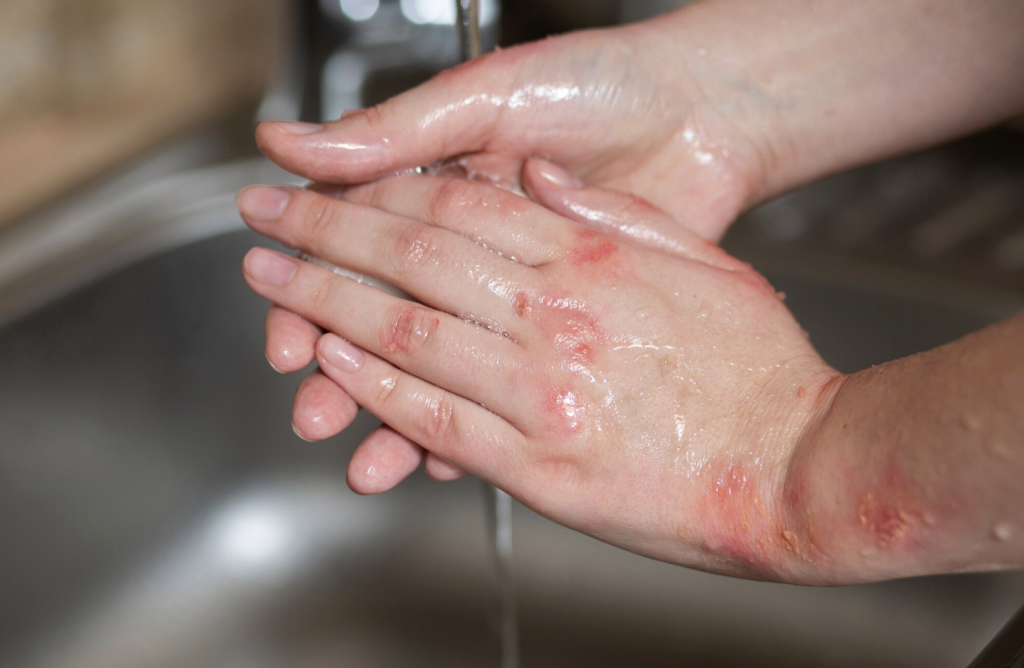
Introduction
Eczema, also known as atopic dermatitis, is a chronic skin condition that causes inflammation, redness, and itchiness. It can significantly impact an individual’s quality of life due to its persistent and often uncomfortable symptoms. While conventional treatments like corticosteroids and antihistamines are commonly used, many people seek natural remedies to manage their condition without the side effects of long-term medication. This article provides an in-depth look at eczema, its causes, symptoms, and effective natural remedies.
Understanding Eczema
What is Eczema?
Eczema is a condition that makes the skin red, inflamed, and itchy. It can occur at any age but is more common in children. The severity of eczema can vary from person to person, with symptoms ranging from mild to severe.
Types of Eczema
There are several types of eczema, including:
- Atopic Dermatitis: The most common form, often starting in childhood and linked to allergies and asthma.
- Contact Dermatitis: Caused by skin contact with irritants or allergens.
- Dyshidrotic Eczema: Characterised by small, itchy blisters on the edges of fingers, toes, palms, and soles.
- Nummular Eczema: Appears as circular, coin-shaped spots on the skin.
- Seborrheic Dermatitis: Often affects the scalp, causing scaly patches, red skin, and stubborn dandruff.
- Stasis Dermatitis: Occurs on the lower legs and is related to circulatory problems.

Causes of Eczema
Eczema is a complex condition with multiple contributing factors. These include:
Genetic Factors
Eczema often runs in families, suggesting a genetic component. If one or both parents have eczema, asthma, or hay fever, the likelihood of a child developing eczema increases.
Immune System Dysfunction
An overactive immune system can trigger an inflammatory response in the skin, leading to eczema symptoms.
Environmental Triggers
Various environmental factors can exacerbate eczema, including:
- Irritants: Soaps, detergents, shampoos, disinfectants, and juices from fresh fruits, meats, or vegetables.
- Allergens: Dust mites, pet dander, pollen, mould, and dandruff.
- Microbes: Bacteria such as Staphylococcus aureus, viruses, and certain fungi.
- Hot and Cold Temperatures: High or low humidity, sweating, and sudden temperature changes.
- Foods: Dairy products, eggs, nuts, and seeds in some individuals.
Stress
Emotional stress can worsen eczema symptoms, although the exact mechanism is not fully understood.
Hormonal Changes
Hormonal fluctuations, especially in women, can trigger or worsen eczema symptoms. This is often observed during pregnancy or menstrual cycles.

Symptoms of Eczema
The symptoms of eczema can vary depending on the type and severity of the condition. Common symptoms include:
- Dry, sensitive skin
- Red, inflamed skin
- Intense itching
- Dark-coloured patches of skin
- Rough, leathery, or scaly patches of skin
- Oozing or crusting
- Areas of swelling
In babies, eczema often appears on the face, especially the cheeks and chin. In children and adults, it typically affects the insides of the elbows, backs of the knees, and the hands and feet.
Natural Remedies for Eczema
Natural remedies can help manage eczema symptoms and reduce the frequency and severity of flare-ups. These treatments focus on soothing the skin, reducing inflammation, and supporting the skin’s barrier function.
1. Coconut Oil
Benefits:
Coconut oil has natural anti-inflammatory and antimicrobial properties. It can help soothe the skin, reduce itching, and prevent infection.
How to Use:
- Direct Application: Apply virgin coconut oil directly to the affected areas of the skin. Use it several times a day, especially after bathing and before bed.
2. Oatmeal Baths
Benefits:
Colloidal oatmeal has anti-inflammatory and antioxidant properties. It helps soothe the skin, reduce itching, and moisturise dry skin.
How to Use:
- Oatmeal Bath: Add 1-2 cups of colloidal oatmeal to a lukewarm bath. Soak for 15-20 minutes, then gently pat the skin dry. Follow with a moisturiser.
3. Aloe Vera
Benefits:
Aloe vera has anti-inflammatory, antibacterial, and wound-healing properties. It helps soothe and hydrate the skin, reducing the symptoms of eczema.
How to Use:
- Aloe Vera Gel: Apply pure aloe vera gel directly to the affected areas. Use it several times a day for best results.
4. Honey
Benefits:
Honey has natural antibacterial and anti-inflammatory properties. It can help heal wounds and reduce inflammation associated with eczema.
How to Use:
- Honey Mask: Apply a thin layer of raw honey to the affected areas. Leave it on for 20-30 minutes before rinsing off with lukewarm water.
5. Apple Cider Vinegar
Benefits:
Apple cider vinegar has antibacterial properties and helps balance the skin’s pH levels. It can reduce the risk of infection and soothe the skin.
How to Use:
- Diluted Solution: Mix one part apple cider vinegar with one part water. Apply the solution to the affected areas using a cotton ball. Rinse off after a few minutes and moisturise.
6. Evening Primrose Oil
Benefits:
Evening primrose oil contains gamma-linolenic acid (GLA), which has anti-inflammatory properties. It can help reduce skin inflammation and improve the skin barrier function.
How to Use:
- Topical Application: Apply evening primrose oil directly to the skin. Alternatively, take evening primrose oil supplements as directed by a healthcare provider.
7. Tea Tree Oil
Benefits:
Tea tree oil has antiseptic, anti-inflammatory, and wound-healing properties. It can help reduce itching, redness, and inflammation.
How to Use:
- Diluted Solution: Dilute tea tree oil with a carrier oil, such as coconut oil, in a 1:10 ratio. Apply the mixture to the affected areas.
8. Turmeric
Benefits:
Turmeric contains curcumin, which has powerful anti-inflammatory and antioxidant properties. It can help reduce inflammation and promote healing.
How to Use:
- Turmeric Paste: Mix turmeric powder with water to form a paste. Apply the paste to the affected areas and leave it on for 10-15 minutes before rinsing off.
9. Probiotics
Benefits:
Probiotics help balance the gut microbiome, which can influence skin health. They may help reduce inflammation and improve eczema symptoms.
How to Use:
- Probiotic Supplements: Take probiotic supplements as directed by a healthcare provider.
- Probiotic Foods: Include probiotic-rich foods in your diet, such as yogurt, kefir, sauerkraut, and kimchi.
10. Shea Butter
Benefits:
Shea butter is rich in fatty acids and vitamins that help moisturise and nourish the skin. It can help reduce dryness and soothe irritated skin.
How to Use:
- Direct Application: Apply shea butter directly to the affected areas. Use it regularly, especially after bathing and before bed.
Lifestyle Changes to Manage Eczema
In addition to natural remedies, certain lifestyle changes can help manage eczema symptoms and reduce the frequency of flare-ups.
1. Moisturise Regularly
Keep the skin moisturised to prevent dryness and irritation. Use a thick, fragrance-free moisturiser several times a day, especially after bathing.
2. Avoid Triggers
Identify and avoid triggers that can worsen eczema symptoms, such as certain soaps, detergents, fabrics, and foods. Keep a diary to track flare-ups and identify potential triggers.
3. Wear Soft, Breathable Fabrics
Choose clothing made from soft, breathable fabrics, such as cotton, to reduce skin irritation. Avoid rough, scratchy, or tight-fitting clothes.
4. Maintain a Healthy Diet
Eat a balanced diet rich in fruits, vegetables, and omega-3 fatty acids. Avoid foods that trigger allergies or sensitivities.
5. Manage Stress
Practice stress-reducing techniques, such as yoga, meditation, and deep breathing exercises. Regular physical activity and hobbies can also help manage stress.
6. Practice Good Hygiene
Keep your skin clean and dry. Bathe in lukewarm water using mild, fragrance-free cleansers. Pat the skin dry with a soft towel and apply a moisturiser immediately.
7. Use a Humidifier
Use a humidifier to maintain optimal humidity levels in your home, especially during dry winter months. This can help prevent the skin from becoming too dry.

Precautions and Considerations
While natural remedies can be effective in managing eczema, it’s essential to approach them with caution and awareness.
- Consultation with Healthcare Providers: Always consult with a healthcare provider before starting any new treatment, especially if you have underlying health conditions or are taking other medications.
- Quality of Ingredients: Ensure the quality and purity of ingredients used in natural remedies. Choose organic products to avoid contaminants.
- Proper Dosage: Be mindful of dosages, as even natural remedies can cause harm if used excessively. Follow recommended guidelines and consult resources for accurate information.
- Allergic Reactions: Be aware of potential allergic reactions. Perform a patch test when using a new topical remedy and start with small doses for oral remedies.
- Research and Evidence: While many natural remedies have historical and anecdotal support, seek out scientific research to validate their efficacy. Reliable sources include peer-reviewed journals and reputable health organisations.
Conclusion
Eczema is a chronic skin condition that can significantly impact an individual’s quality of life. Natural remedies offer a safe and effective way to manage symptoms and reduce the frequency of flare-ups. By incorporating remedies such as coconut oil, oatmeal baths, aloe vera, honey, apple cider vinegar, evening primrose oil, tea tree oil, turmeric, probiotics, and shea butter, individuals can find relief and support their overall skin health. Additionally, adopting healthy lifestyle changes, such as moisturising regularly, avoiding triggers, wearing soft fabrics, maintaining a healthy diet, managing stress, practicing good hygiene, and using a humidifier, can further enhance the management of eczema. Always approach natural remedies with caution, consult with healthcare providers, and ensure the quality and proper usage of ingredients to achieve the best results.
